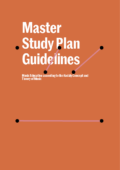The Master’s programme in Theory of Music builds on the knowledge you have acquired in the Bachelor’s course. With this Master’s degree you will be fully qualified to teach music theory at every level, including at a conservatory or the Musicology faculty at a university. The vast majority of jobs that are advertised today stipulate a Master’s degree as a requirement.
In the Master Theory of Music, you can determine the direction you wish to take in the curriculum. You can choose for a focus on the Early Music, with the analysis & creating music courses on the 14th till 18th century in combination with Basso Continuo, for a Classical variant with a focus on the repertoire from the second half of the 18th century up to the present, or the new Jazz variant with a analysis & creating music course that focuses on Jazz repertoire. You can even combine those three directions by choosing your Theory of Music electives carefully.
There are three main strands in the Classical variant to the two-year Master’s curriculum:
The first is Artistic Development: these are modules covering the core repertoire of this variant of the Master’s programme − Western music from the late Renaissance up to the present day. You will learn to follow the Analysis/Creating Music/Literature model and will also be able to take various electives.
The second strand is research: it is important to us that you develop into an self-sufficient musician, with the ability to adapt to the ever-changing practice. Therefore, you will conduct your own research within you Master's Degree. You may use the Kodály Specialisation of the Royal Conservatoire in this endeavour as well. You will be guided by a supervisor, follow an introductory course on artistic research and an elective in the first year. You participate in the Master circle - a peer-to-peer group of students and a circle leader. At the end of your Master's Degree, you present the results of your research. By visiting meetings, congresses, symposia, and study days, you become involved in music theory and versed in international music theory discourse.
When you apply for the Master, you hand in your Master Plan, in which you describe how you would like to set up your Master's Degree.
The third strand is Professsional Preparation: you will perform research into a specific aspect of methodology and present the results in writing and orally. In that context, you will also participate actively in the international discourse (in this case specifically with respect to the teaching of music).
There are also three main strands in the Early Music variant to the two-year Master's curriculum:
The first is Artistic Development: this module contains three courses in which creating music, analysis and literature/research of sources are integrated according to the ACML formula: Analysis/Creating Music/Literature. Each of the courses encompasses an historical period: the Middle Ages and Renaissance, from Baroque to Late Baroque and Classical and early Romantic. In addition to the core subject of Basso continuo/partimento, you will also choose a number of electives, such as improvisation in different styles, the philosophy/aesthetics of music, rhetoric and affect theory, notation, Liturgical/Gregorian and vocal/ensemble conducting.
The second strand is Research: we would like you to develop into an independentaly functioning musician, who can adapt to the constantly changing practice. Therefore, you will perform your own Master’s research. You will be guided by your supervisor, besides attending an introductory course on conducting research and an elective in the first year. You will participate in the Master circle - a peeer-to-peer group, consisting of fellow students and a circle leader. At the end of your degree, you will present your conclusions. In that context, you will participate in the international discourse on music theory and/or music teaching by writing papers and participating at conferences , symposia, study days, etc. You will engage fully with the music theory community and visit music institutes in other countries. Because you are part of music theory life, visits to institutions in other countries are crucial to your research.
The third strand is Professsional Preparation: you will perform research into a specific aspect of methodology and present the results in writing and orally. In that context, you will also participate actively in the international discourse (in this case specifically with respect to the teaching of music). Here, among other things, issues are discussed that are specifically related to teaching at an Early Music Department, such as the design of a course "Aural Skills & Analysis" for early music students and selecting and creating solfège material that focuses on the Early Music repertoire. You will do internships at courses given at our Early Music department. An internship at a foreign institute is of course also possible.










